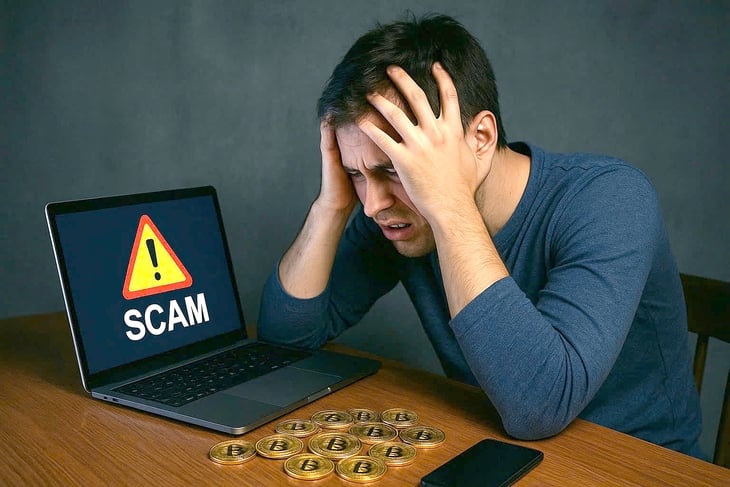
Users should be cautious of many fraudulent projects using virtual currency - Illustration: AI
Statistics from organizations show that there are more than 18,000 different cryptocurrencies in the world , including coins, tokens and other forms. This number is constantly changing because new projects are launched regularly. In Vietnam alone, statistics from Yield Guild Games (YGG SEA) show that as of early May 2025, there are about 1,000 blockchain game projects still being implemented.
100 billion USD investment channel
According to VinaCapital estimates, up to 17 million Vietnamese people have participated in cryptocurrency trading, with a total estimated transaction value of over 100 billion USD per year. Notably, all activities take place on foreign exchanges such as Binance, Bybit and other platforms in Singapore, Korea, Hong Kong...
Not only famous high liquidity coins such as Bitcoin, Ethereum... are interested, many tokens issued by Vietnamese enterprises are also being invested in by investors. Among them, many projects have been exposed for fraud. For example, the Antex project of Mr. Nguyen Hoa Binh (Shark Binh) - Chairman of NextTech Group.
Mr. Binh and his accomplices were accused of withdrawing money from 30,000 investors' wallets, appropriating a particularly large sum of money from investors. Previously, the Alos Coin virtual currency fraud ring was exposed, causing a stir when the number of participants reached 32,000 people. Many investors poured billions into this project with the hope of getting rich quickly with an interest rate of 180% per year.
In August 2025, the police also arrested the leaders of the Wingstep and Game Naga Kingdom projects, accused of raising 7.86 million USD (about 200 billion VND) from more than 3,000 investors. The groups all promised extremely "huge" profits, but the projects collapsed after only 3 months, causing investors to lose everything.
It is undeniable that fraudulent cryptocurrency projects are appearing densely, but even many projects issued by Vietnamese enterprises, once considered "successful", listed on international exchanges and causing a stir, still cause losses to investors. For example, the price of KardiaChain's KAI token from a peak of 0.16 USD in April 2021 then fell sharply, trading around 0.001 USD.
Speaking to Tuoi Tre, Mr. Phan Phuong Nam, Deputy Dean of the Faculty of Commercial Law at Ho Chi Minh City University of Law, said that the crypto-asset market opens up a completely new channel for capital mobilization. When physical assets such as real estate, gold or intellectual property rights are digitized and divided into tokens..., businesses can reach more groups of investors - including international investors - without depending entirely on bank loans or traditional stock issuance.
"Tokenization" of assets not only helps improve liquidity and optimize capital efficiency, but also promotes financial innovation in the private sector, paving the way for innovative business models. However, the development of this market needs to go hand in hand with transparency and legal compliance, to avoid repeating mistakes and distorting investor confidence after a series of recent incidents," said Mr. Nam.
Vietnam has issued a pilot resolution on the digital asset market, but no trading floor has been licensed to operate, nor has it announced which cryptocurrency is officially allowed to be traded. According to Mr. Nam, if the management agency does not soon develop a communication plan and specific management solutions, the market is very likely to explode with new "chicken herding" tricks such as inviting participants to participate in trading floors or fake investment consulting companies...
Many cryptocurrency scams
According to experts' warnings, the biggest risk of the cryptocurrency market is that investors spend money on "disguised" projects, taking advantage of the blockchain concept for personal gain. Some common forms of fraud include project clones, projects promising huge profits, multi-level projects "disguised" as crypto, coin mining machine sales models...
Taking advantage of investors' FOMO (fear of missing out) psychology, these subjects will launch a new project with the same features or functions as the previous successful project - a kind of "project clone". And with promotional tricks, these subjects make investors believe that the new project is as successful as the previous project in order to raise as much capital as possible before disappearing.
For example, AntEx launched in 2021 - 2022 in the context of DeFi, stablecoin, CEX/DEX and all-in-one ecosystem being extremely "hot". The project announced to build VNDT (VND-anchored stablecoin), e-wallet, exchange, private blockchain, payment system. After the project raised 7.3 million USD and issued tokens to investors, the token price began to drop by more than 99% and the project team was no longer active.
In addition, according to Mr. Tran Xuan Tien - General Secretary of the Ho Chi Minh City Blockchain Association, another popular form in the cryptocurrency market is the promise of huge profits. Accordingly, project groups will encourage investors to buy tokens and hold them for as long as possible, because the profits in a short time are very low. With high-end promotional packages, invited investors will have to spend a large amount of money with the promise of profits increasing exponentially.
When the project has attracted a large enough number, these subjects will disappear with the money raised, typically "ifan". With multi-level projects "disguised" as crypto, the subjects lure with profit-sharing towers. Initially, the project will invite customers by promising huge profits. After the F1 generation is born, the project begins to open the commission feature, allowing old customers to enjoy profits when inviting new customers.
When new customers buy investment packages, a part of this money will be paid to the F1 generation. This system will continue to operate until there are no more new customers, then there will be no more money to pay profits to customers. A typical example of this group is Lion Group, a Forex and crypto investment trust, paying interest regularly until it collapsed.
In addition, with the coin mining machine sales model, the project group follows the story of getting rich thanks to Bitcoin mining. "The initial price increase comes largely from the "virtual demand" created by the system itself. The source of payment for investors is mainly from the money later people pay in," Mr. Tien affirmed.
Therefore, according to Mr. Phan Phuong Nam, the legal corridor can only be a barrier, but cannot be an absolute shield to help investors avoid risks. "What is more necessary than the law, perhaps, is the vigilance of each person. When a new investment "deal" appears, pause for a moment to ask yourself whether you are investing rationally, or being swept away by greed?", Mr. Nam said.
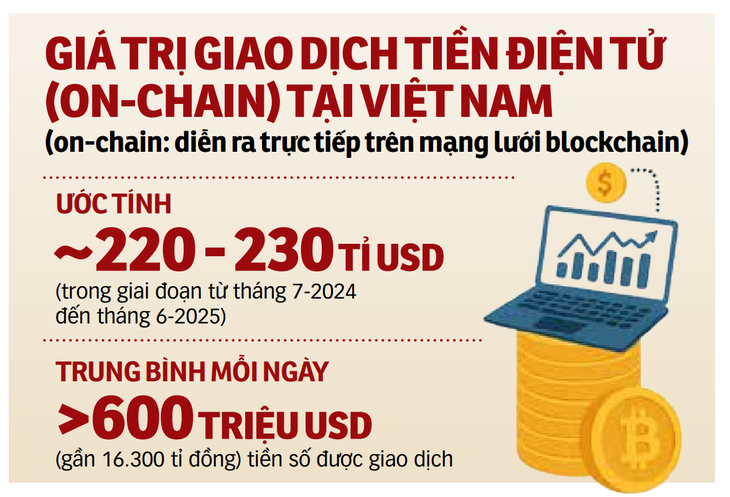
Source: Chainalysis - Graphics: TAN DAT
Many risks from cyber attacks
In addition to the risks from the project itself, experts also warn investors to be careful with the increasing number of cyber security threats, focusing more on cryptocurrency players. According to Kaspersky Security Company, cybercriminals can take advantage of Model Context Protocol (MCP) - an open-source artificial intelligence (AI) connection protocol - to conduct supply chain attacks, leak passwords, credit card information, cryptocurrency wallets and other sensitive data...
According to Kaspersky experts through simulation experiments of attacks, users are easily fooled because they do not recognize unusual signs. The security company warns users to be vigilant that cybercriminals can take advantage of this method not only to steal sensitive data, but also to perform other dangerous actions such as running malicious code, installing backdoors or spreading ransomware.
Don't rush to invest without learning
Mr. Tran Quan, a cybersecurity technology expert, said that most tokens today are utility tokens, used for payment or use of services in the project's ecosystem, similar to vouchers. Unlike stocks, tokens do not bring dividends or ownership rights. The value of tokens depends entirely on the level of development and reliability of the issuing platform.
If the platform is used by many people, the token price can increase and vice versa, investors will bear the risk of losing value. "The first principle of investing is to clearly understand the value that the platform brings to users. If the project does not create real value - whether it is a coin, token, stock or any other asset - investing is potentially high risk - he said and advised - It is best not to rush into investing when you do not understand. Read carefully, learn carefully before spending money".
High-risk financial products
Ms. Nguyen Ngoc Son Quynh, Chief Operating Officer (COO) of Kyros Ventures - a cryptocurrency investment fund, emphasized the fundamental difference between cryptocurrencies such as Bitcoin (BTC) or Ethereum (ETH) and tokens issued by Vietnamese enterprises lies in the technology platform, usage goals and level of decentralization.
Accordingly, BTC and ETH are native tokens of blockchains, which have a global decentralized network, operate transparently and are not controlled by any individual or organization. Their value is formed from community trust, system security and the ability to operate as an open financial infrastructure where everyone can participate, transact and authenticate without the need for intermediaries.
In contrast, most tokens issued by Vietnamese enterprises do not have their own blockchain but are based on existing platforms such as Ethereum or BNB Smart Chain, called utility tokens or custom tokens. These tokens are usually only used in the ecosystem, rewarding users, or raising capital for the project. The right to issue, control, and price all depend on the development team.
"Therefore, if BTC or ETH are considered "digital gold" or "core infrastructure of the Web3 economy", Vietnamese enterprise tokens should only be considered as a risky financial product. Investors need to carefully evaluate their transparency, operating mechanism and control before deciding to invest," Ms. Quynh advised.
Source: https://tuoitre.vn/tu-vu-antex-cua-shark-binh-canh-bao-nhung-chieu-thuc-lua-dao-tien-so-20251021224652289.htm








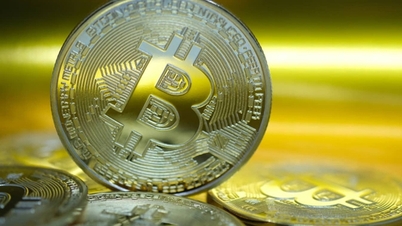

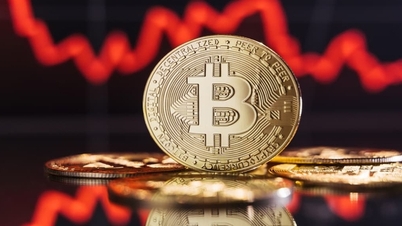
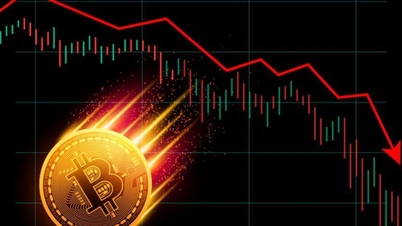
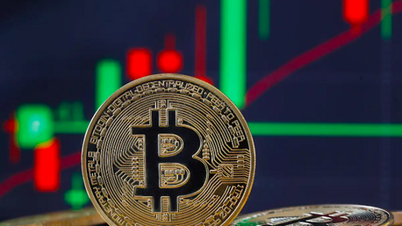
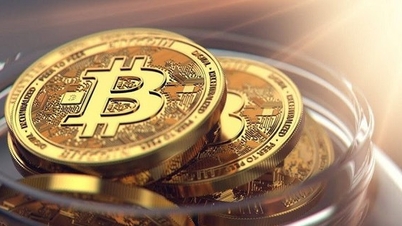
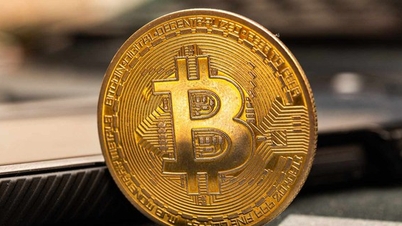





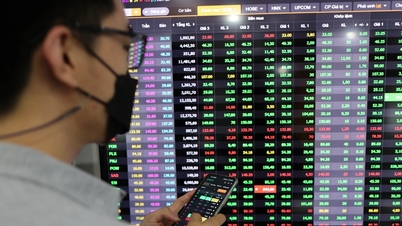
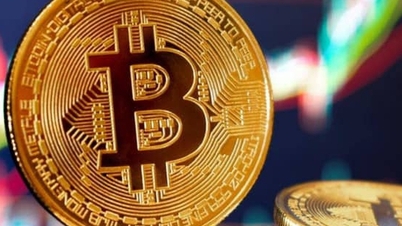
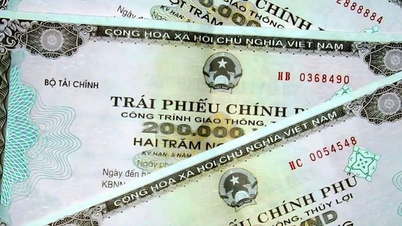











![[Photo] National Assembly Chairman Tran Thanh Man attends the VinFuture 2025 Award Ceremony](/_next/image?url=https%3A%2F%2Fvphoto.vietnam.vn%2Fthumb%2F1200x675%2Fvietnam%2Fresource%2FIMAGE%2F2025%2F12%2F05%2F1764951162416_2628509768338816493-6995-jpg.webp&w=3840&q=75)











































































Comment (0)